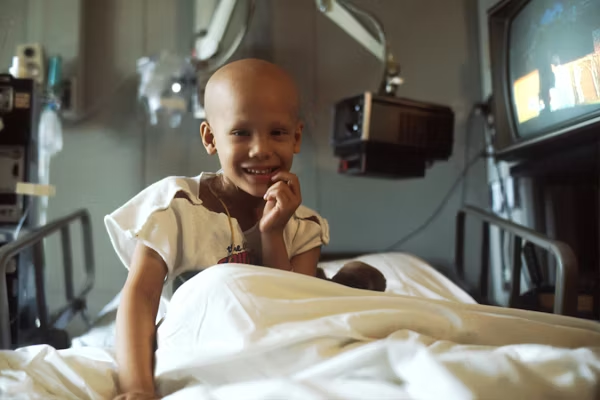
The Emotional Rollercoaster of a Leukemia Diagnosis
A leukemia diagnosis is a shocking and overwhelming experience that affects millions of people in the United States alone. According to Statista, the death rate of leukemia was 5.8 per 100,000 people in 2021. The impact of leukemia extends far beyond the physical symptoms, affecting the emotional and psychological well-being of patients and their families.
This blog post aims to explore the emotional consequences that accompany a leukemia diagnosis. We’ll learn about the initial shock, the waves of fear and anxiety, the struggle with depression, and the ripple effects on loved ones.
Initial Shock of Diagnosis and Denial
According to the American Cancer Society, 1 in 3 adults in the United States has Acute Myeloid Leukemia. Approximately 11,220 lives are tragically predicted to be lost to this disease in 2024. The moment a leukemia diagnosis is delivered, it’s like a punch to the gut, leaving patients and families reeling in shock. The world seems to tilt on its axis as they struggle with the sudden, terrifying reality of this blood cancer.
The news often comes as a complete surprise, leaving many searching for answers and grappling with disbelief and numbness. The causes of leukemia can be varied, ranging from genetic predispositions to environmental exposures.
However, one potential and unexpected cause of leukemia that you should be aware of is exposure to AFFF firefighting foam. AFFF, or aqueous film-forming foam, contains PFAS chemicals known for their persistence in the environment and the human body.
According to the National Cancer Institute, certain PFAS chemicals exposure is linked to an increased risk of leukemia in children. This revelation adds another layer of complexity to the already challenging experience of a leukemia diagnosis. This is particularly true for individuals exposed to AFFF through their work or living near military bases where the foam was used extensively.
The revelation of the link between AFFF firefighting foam and leukemia has led many patients and their families to take legal action. They seek accountability and compensation from those responsible for the uncontrolled spread of AFFF-led PFAS chemicals. The AFFF lawsuit settlement amounts to around $75,000 to $500,000, reflecting the severity and health issues due to AFFF.
TorHoerman Law says these AFFF lawsuits claim manufacturers were aware of possible health dangers linked to their products but didn’t warn users. They accuse these companies of negligence, prioritizing profits over public safety.
For individuals battling leukemia, the financial and emotional burden can be overwhelming. The mind struggles to accept such a devastating diagnosis, creating a buffer against the emotions that threaten to surface.
While denial can be a natural coping mechanism in the short term, it can also hinder the decision-making process regarding treatment and care.
What is a stage 1 leukemia diagnosis?
A stage 1 leukemia diagnosis typically indicates the early stage of the disease. It’s characterized by a higher lymphocyte count in the blood cells and often enlarged lymph nodes. While other symptoms might not be present, this stage signifies the abnormal proliferation of white blood cells, a hallmark of leukemia.
Waves of Fear and Anxiety
According to a study, anxiety is commonly found in patients with acute myeloid leukemia. The uncertainty surrounding the disease, its treatment, and its potential outcomes can lead to this overwhelming disorder. Patients may grapple with a fear of the unknown, worrying about the progression of their illness, the effectiveness of treatment, and their prognosis.
Treatment itself can be a source of significant anxiety. The prospect of chemotherapy, radiation, or a bone marrow transplant, along with their potential side effects, can be challenging. The fear of pain, nausea, hair loss, and other complications can loom large, adding to the emotional burden of the diagnosis.
Anxiety can manifest in various ways, from physical symptoms like insomnia and fatigue to emotional distress and difficulty concentrating. It can also affect treatment adherence, as patients may struggle to cope with the emotional and physical demands of their care plan.
How do you treat anxiety after cancer diagnosis?
Anxiety after a cancer diagnosis is common. Treatment involves a combination of therapies, including cognitive-behavioral therapy, mindfulness practices like meditation, relaxation techniques, and potentially medication. Support groups and open communication with loved ones and healthcare providers are also crucial for managing anxiety.
The Struggle with Depression and Hopelessness
The emotional weight of a leukemia diagnosis can often lead to sadness and despair. As the reality of the illness sets in, feelings of hopelessness may creep in, casting a dark cloud over the patient’s outlook. Depression, a chronic and life-threatening disease, can manifest in various ways, impacting both the physical and emotional well-being of those affected.
Common symptoms of depression in leukemia patients include persistent sadness, a loss of interest in previously enjoyed activities, and overwhelming fatigue. Changes in appetite, sleep disturbances, and difficulty concentrating may also arise. In some cases, individuals may experience feelings of worthlessness or even suicidal thoughts.
It’s crucial to recognize that depression is not a sign of weakness or a character flaw. It’s a natural response to the immense challenges posed by a leukemia diagnosis. Studies indicate that up to 30% of cancer patients experience some level of depression and other mental health issues. It highlights the importance of addressing mental health alongside physical treatment.
Recognizing the signs of depression and seeking help is essential. Mental health professionals can provide valuable support and guidance, helping patients develop coping strategies for their illness.
Does leukemia affect your thinking?
Yes, leukemia can affect your thinking. This can happen due to the disease itself or as a side effect of treatment. Some common cognitive issues associated with leukemia include difficulty concentrating, memory problems, and a feeling of mental fogginess.
The Ripple Effect on Family and Loved Ones
A leukemia diagnosis also sends shockwaves through their entire network of family and friends. Loved ones often experience helplessness while watching someone they care about with such a severe illness. Feelings of guilt may also surface as they question if they could have done something to prevent the diagnosis or ease the suffering.
The fear of losing a loved one is ever-present, creating an atmosphere of anxiety and uncertainty within the family unit. The practical demands of caregiving can compound these emotional challenges. Family members often step into the role of caregiver, providing physical and emotional support, managing medical appointments, and complexities of treatment. This added responsibility can lead to significant stress, fatigue, and even depression in caregivers themselves.
Open communication and mutual support within the family unit are vital during this challenging time. Sharing feelings, fears, and concerns can help foster connection and understanding. It’s also important to recognize that seeking professional help is not a weakness but a courageous step toward healing. Patients and their families can benefit from therapy, connecting with others facing similar challenges and gaining valuable coping strategies.
In conclusion, the emotional rollercoaster of a leukemia diagnosis is undeniable. It is marked by shock, fear, anxiety, and, at times, despair. However, by acknowledging the psychological impact of the disease and seeking appropriate support, individuals can face the challenges with greater strength.
These resources, from support groups and counseling services to financial assistance programs, can provide invaluable support throughout the treatment journey and beyond.
Individuals and families can face leukemia head-on by staying informed, connected, and empowered. They can emerge from the experience with a renewed appreciation for life’s precious moments.



Average Rating